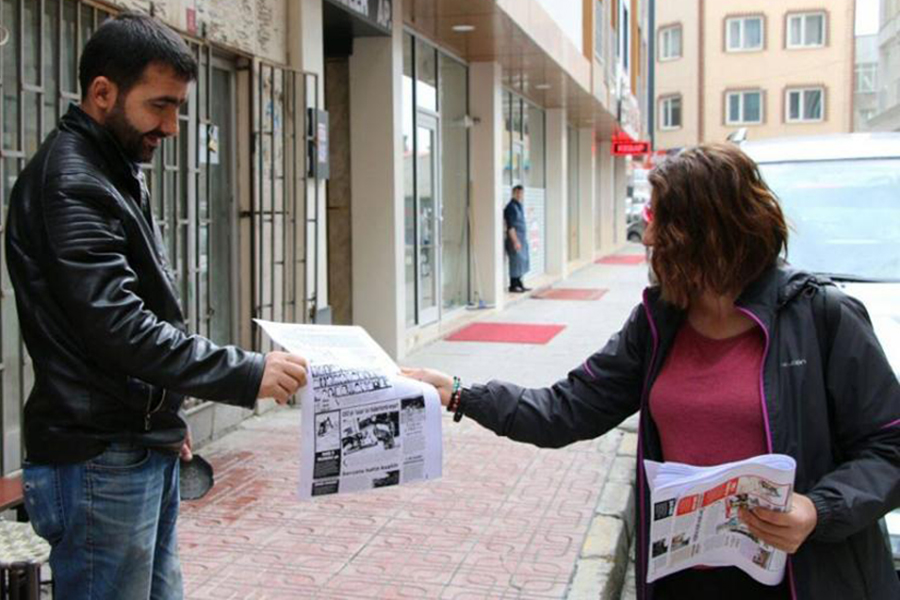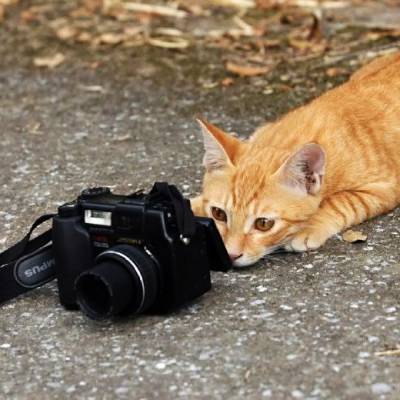Français | English
Only Kurdish-language information newspaper still freely distributed within the Turkish borders, Xwebûn celebrated its 100th issue in mid-November.
The history of the Kurdish press in Turkey is inextricably linked to the political and military struggle for the recognition and autonomy of the Kurdish people. Often prohibited, independent Kurdish journalists working in it are regularly subjected to police repression and arrested. Many of them have been assassinated, as was the case for Musa Anter, Kurdish political figure and writer, often considered as one of the major figures of free Kurdish reporting.
The editorial offices of Xwebûn are located in a large villa on the outskirts of Amed (Diyarbakır). In fine weather, between two closings, the newspaper workers collectively grow fruit and vegetable. A debonair dog joyously greets visitors. Journalists, editors, graphic artists, paste-up artists… the Xwebûn team is young with a few members having a long experience of Kurdish press and an important number of women.

Xwebûn offices (photo Loez)
The following comments were transcribed from a collective discussion, therefore the participants will be considered as a group, without individual distinctions. Comments in italics were added by transcribers.
What is the meaning of the word “Xwebûn” ?
To be aware, to be one’s self. This is our objective. You must know yourself before knowing anything else. Our people must have access to information in their own language. We wish to go on making people aware, no matter what happens. If the newspaper is closed down, we will start another, as has been the case on a number of occasions. Even if Kurdish letters and language are not formally prohibited, in practical terms, they are censored in Turkey
When did the Xwebûn adventure begin ?
We started publishing in 2019. Prior to this, there was only one newspaper in Kurdish, Azadiya Welat.
Azadiya Welat (literally Freedom of the native country) began as a weekly in 1996 in Istanbul. It became a daily in 2006. The newspaper’s teams were regularly subjected to brutal repression.
Azadiya Welat was closed down in August 2016, following the coup d’état. We protested by distributing a photocopy of the final issue to our readers. Following the closing of Azadiya Welat, there were two or three attempts at publishing under another name. Publishing Kurdish newspapers in Turkey became more complicated…We re-started Welat, but the editor we contacted refused to publish it. He refused without wishing to explain why. This is why we launched Xwebûn online in 2019. But our readership also wanted a paper edition. We searched for another publisher, and found a small, older firm. They are slower but this suits us. We now publish on a weekly basis.

The photocopy of the final issue of Azadiya Welat

Distribution of the final issue…
“Our people must have access to the news in their own language.”
What do you publish?
Our paper edition is a weekly, but we publish daily on our website. You can find streaming news there, and on the weekly, we rather publish reports, special dossiers, analysis and opinion pieces. We also attempt to relay women’s voices.
Currently we are also working on a projected digital newspaper. We are looking for solutions to continue improving our publication which is the fruit of a tradition or more than thirty years. Kurdish journalism is not new and the team is not made up only of beginners with no previous experience of the press. Recently, we began producing videos. We also attempted podcasts, but they did not have much success.
Are you salaried or volunteers?
We don’t work for free. All the colleagues are paid but at a minimum rate, close to volunteering.
One of the journalists corrects the question: she does not want to use the word ‘salary’ with its capitalist connotations, preferring a term close to ‘indemnity’.
We don’t compare these means with those of other media, particularly those in the press in Turkey. Press workers already receive very low wages, in our case they are even lower. They are sufficient to cover our minimal needs. Money isn’t what motivates us. If that were the case, we would work in other sectors. We are fired by the determination to make our language, our people, our culture exist and carry on.
How do you manage to cover all the regions of Kurdistan?
We don’t have dedicated correspondents, but we have a network of relationships with local journalists, shall we say. We have authors in the four parts of Kurdistan, Bakur, Rojhilat, Rojava, Başûr an an editorial board in which all zones are represented. This matters greatly to us. We can gather information through this angle.
In what languages to you publish?
Kurmanjî, zazakî. We also want to incorporate soranî. We have launched initiatives to this end, we have spoken with authors who write in soranî. But soranî constitutes an additional problem for us because that language is not written with the latin alphabet. We haven’t resolved the difficulty yet, but the will to do so is very much at the fore.
(Another person adds)
Our equipment and digital installation do not allow the use of the arabic alphabet, that’s the main problem.
(The first person continues)
So currently, we publish essentially in kurmanjî, with also a page in zazakî.
How is your newspaper distributed, sold?
We attempt to send the paper issue everywhere in Kurdistan. You can also find it in the main Turkish cities such as Istanbul, Izmir, Ankara, Mersin, Adana for the Kurds who live there… The digital version is read in every country where Kurds reside.
Do your have subscribers who receive the paper edition?
Yes, in fact, this is what I meant when I said we “send” it. We do not send it to the distributors because they raise difficulties. They don’t tell us directly “we won’t sell your paper” but they request money to sell it, knowing that additional costs would put us in financial difficulty. It’s a form of blocking.
This problem existed already in the days of Azadiya Welat which sold very well and had an important run. We were not paid before more than 3 000 copies were sold, and every month, the sellers received 10 000 copies. On a yearly basis, this represented an important budget, something like 1,5 trillion Turkish lira of the period, without recovering a single centime… But at the time, we preferred going through the distributors despite this, with the sole aim of getting the newspaper into the prisons…Because prisons refuse newspapers that don’t come from the distributors.
Currently with our limited means and conditions, it would be impossible for us to work with distributors-sellers.
Kurdish media have often been distributed clandestinely, prohibited by Turkish authorities who categorically refuse to acknowledge the existence of the Kurdish language, this was notably the case in the 90s. For example, the short film Çerx, released in 2021, recalls the story of Musa Anter’s “little generals”, those teenagers who risked their lives secretly distributing newspapers such as Özgür Ülke. More recently, in 2014, Kadri Bağdu was assassinated in Adana in a predominantly Kurdish neighbourhood where he lived and handled the distribution of Azadiya Welat. Two ISIS militants claimed the murder, but it is hard not to see the shadow of Turkish secret services in it. Tens of thousands of people showed up for his funeral.

Kadri Bağdu
“In fact, our newspaper also serves as training for the re-acquisition of the language and of the trade of journalism.”
Who reads Xwebûn?
(They laugh)
For all those who can read Kurdish.
(Another person)
But few people know how to read Kurdish.
(He continues)
Yes, but that’s normal, since there’s no teaching done in Kurdish. No schools, nothing…We learn our language from our parents, in the family, orally. We attempt to dig deeper later. We don’t have access to reading and writing in Kurdish at any stage in our schooling, not in kindergarten, not in grammar school nor in college, in High School or at the university.
The fact of producing a newspaper in a language for which there is no teaching raises additional specific difficulties. For example, I would like to work as a journalist in my maternal tongue, I come here, I must first re-learn my own tongue…then, I can train in journalism. In fact, our newspaper also plays a role in training for the re-acquisition of the language and of the trade of journalism. Again, I can quote from the experience of Azadiya Welat. Dozens of journalists and authors were trained by that newspaper. Countless authors who published books, poetry collections, came from Azadiya Welat. It played an important role.
As Xwebûn, we have a public. Our wish, our aim is to widen it…
How do you go about writing in a language everyone can understand?
This is a difficult question (They laugh). Because we’ve been receiving criticism for years. “We read the newspaper but we don’t understand everything” say our readers. As I said, when there is no teaching done in the maternal language, it’s difficult… In Turkey, the dominant language is Turkish. We have a few media whereas in Turkish, there are dozens of newspapers, dozens of TV channels, news agencies… But the truth is that if you bring a regular newspaper in Turkish to a villager in the heart of Anatolia he probably won’t understand it either, having not been correctly schooled
We try to simplify the language as much as possible so it can be easily understood. But that raises another fear in us. We ask ourselves if by doing so we are not deteriorating our language, without wanting to… In wanting to simplify, standardise, one must not degrade, it’s a hard balance to achieve. But we’ve managed to overcome quite a lot of difficulties, there exists a relatively defined language since Azadiya Welat. It is used by several papers published in Kurdish. Some words, expressions and figures of speech are part of the spoken language and are used in everyday life.
Do you fear censorship?
To this question that did not receive a recorded answer, one of the journalists explained that they are very careful of the words they use, in order to avoid censorship and judicial procedures. However, she underscores that this constitutes a form of self-censorship. Up until now, the newspaper has been tolerated by the authorities, but for how long?
The fact of publishing in Kurdish makes avoiding censorship a bit easier explains another journalist concerning publications on Twitter, because the State doesn’t control writings in Kurdish as easily. It knows that they are read by a minority in any event. With all of these precautions, the newspaper continues to resist despite the difficulties.
Interview conducted by Loez, in April 2021
Adapted in English from French by Renée Lucie Bourges.
Image à la Une : Xwebûn, la rédaction. (photo Loez)



